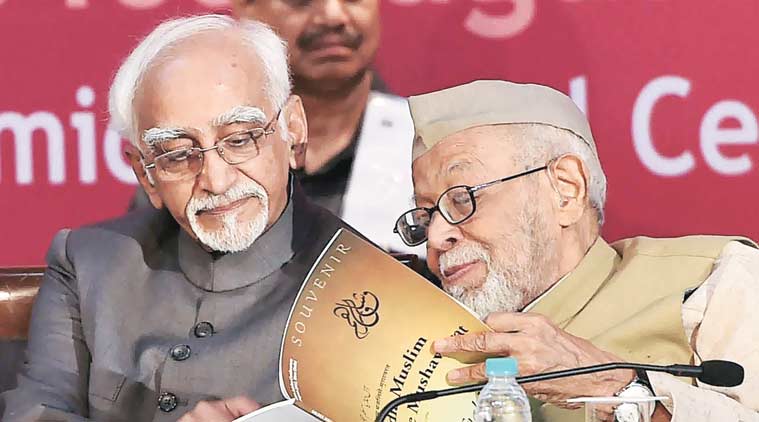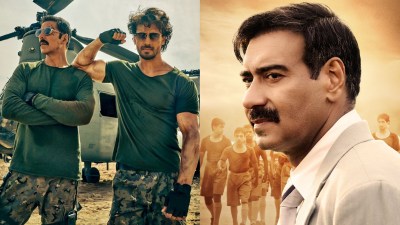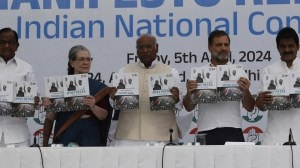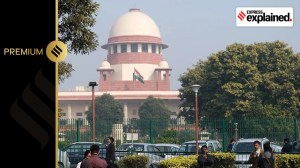- India
- International
Affirmative action for Muslims key to sabka saath, sabka vikas: VP Hamid Ansari
Sections trapped in vicious circle, culturally defensive posture (where) modernity seen as tainted, Ansari said.
 Vice President Hamid Ansari with Syed Shahabuddin at the golden jubilee celebration of All India Muslim Majlis-e-Mushawarat in New Delhi on Monday. (Source: PTI photo)
Vice President Hamid Ansari with Syed Shahabuddin at the golden jubilee celebration of All India Muslim Majlis-e-Mushawarat in New Delhi on Monday. (Source: PTI photo)
Describing as “commendable” the “official objective of Sabka Saath, Sabka Vikas”, the government’s policy initiative for inclusive development, Vice President Hamid Ansari underlined Monday that “a pre-requisite for this is affirmative action (where necessary) to ensure a common starting point”.
“The default by the State or its agents in terms of deprivation, exclusion and discrimination (including failure to provide security) is to be corrected by the State; this needs to be done at the earliest and appropriate instruments developed for it,” Ansari said at the golden jubilee session of the All India Muslim Majlis-e-Mushawarat in New Delhi.
[related-post]
Asking Muslims to also look inward and see what they have done to redress “identified shortcomings”, he said “corrective strategies, therefore, have to be sought on category-differentiation admissible in Indian state practice and hitherto denied to Muslims (Scheduled Caste status) or inadequately admitted (segments of OBC status). Available data makes it clear that a high percentage of Muslims falls into these two broad categories.”
Read – Opinion: Bend it like Bhalla
Referring to a “compendium of official reports”, he listed “principal problems confronting India’s Muslims” as “identity and security; education and empowerment; equitable share in the largesse of the state; and fair share in decision-making”.
Read – VHP calls Hamid Ansari’s affirmative action for Muslims comment ‘political’ and ‘communal’

Each of these, he said, is a right of the citizen. “The shortcomings in regard to each have been analysed threadbare. The challenge before us today is to develop strategies and methodologies to address them… Political sagacity, the imperative of social peace, and public opinion play an important role in it. Experience shows that the corrective has to be both at the policy and the implementation levels; the latter, in particular, necessitates mechanisms to ensure active cooperation of the State governments.”
He said Muslims were “made to carry, unfairly, the burden of political events and compromises that resulted in the Partition. The process of recovery from that trauma has been gradual and uneven, and at times painful. They have hesitatingly sought to tend to their wounds, face the challenges and seek to develop response patterns. Success has been achieved in some measure; much more, however, needs to be done.”
“Equally relevant is the autonomous effort by the community itself in regard to its identified shortcomings. What has it done to redress the backwardness and poverty arising out of socio-economic and educational under-development? How adequate is the response in relation to the challenge?”
“It is evident that significant sections of the community remain trapped in a vicious circle and in a culturally defensive posture that hinders self advancement. Tradition is made sacrosanct but the rationale of tradition is all but forgotten. Jadeediyat or modernity has become a tainted expression. Such a mindset constrains critical thinking necessary both for the affirmation of faith and for the wellbeing of the community.”
“The instrumentality of adaptation to change — Ijtihad — is frowned upon or glossed over. Forgotten is its purpose, defined by the late Sheikh Abul Hasan Ali Nadwi as ‘the ability to cope with the ever-changing pattern of life’s requirements’. Equally relevant is Imam Al-Ghazali’s delineation of the ambit of Maslaha — protection of religion, life, intellect, lineage and property. Both provide ample theoretical space for focused thinking on social change without impinging on the fundamentals of faith.”
He said the Mushawarat had a critical role to play. “As a grouping of leading and most respected minds of the community, it should go beyond looking at questions of identity and dignity in a defensive mode and explore how both can be furthered in a changing India and a changing world. It should widen its ambit to hitherto unexplored or inadequately explored requirements of all segments of the community particularly women, youth, and non-elite sections who together constitute the overwhelming majority.”
“This effort has to be made in the context of Indian conditions and the uniqueness of its three dimensions: plural, secular and democratic… This would necessitate sustained and candid interaction with fellow citizens without a syndrome of superiority or inferiority and can be fruitful only in the actual implementation of the principles of justice, equality and fraternity inscribed in the Preamble of the Constitution and the totality of Fundamental Rights.”
“The failure to communicate with the wider community in sufficient measure has tended to freeze the boundaries of diversities that characterise Indian society. Efforts may be made to isolate the community; such an approach should be resisted. The Indian experience of a large Muslim minority living in secular polity, however imperfect, could even be a model for others to emulate,” he said.
Apr 25: Latest News
- 01
- 02
- 03
- 04
- 05































